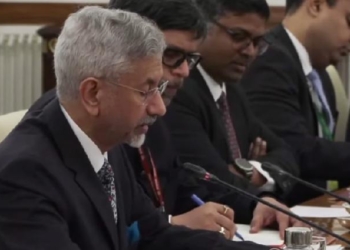Mumbai: Defence Minister Rajnath Singh will commission the country’s most potent indigenous stealth guided missile destroyer, ‘Imphal’, to the Indian Navy on Tuesday, officials said here.
This will be the third of four ‘Visakhapatnam’ Class destroyers, indigenously designed by the Navy’s in-house organisation, Warship Design Bureau, and built by the Mazagon Dock Shipbuilders Ltd (MDSL).
Delivered to the Indian Navy on October 20, 2023 after a rigorous and comprehensive trial programme in the harbour and at sea, it’s the first warship named after a city from the country’s Northeast, Manipur capital Imphal, following approval from the President in April 2019.
After trials, Imphal became the first indigenous pre-commissioning warship which successfully test-fired the extended-range supersonic BrahMos Missiles in November 2023, thus demonstrating Navy’s thrust on combat effectiveness and confidence in its cutting-edge indigenous weapons and platforms.
Singh had unveiled the ship’s crest in New Delhi on November 28 along with Manipur Chief Minister N. Biren Singh and other top civil and defence dignitaries.
The state-of-art warship Project 15B (Visakhapatnam Class) is the latest in the lineage of Project 15A (Kolkata Class) and Project 15 (Delhi Class) destroyers, all indigenous with upgraded capabilities and 75 per cent localised content with contributions form the public and private sectors, MSMEs and the DRDO.
Described as a formidable sailing fortress at sea, the Imphal is 163-metre long, displacing 7,400 tonnes, speeds of more than 30 nautical miles and packed with sophisticated weaponry, sensors like surface-to-surface missiles and surface-to-air missiles.
It is fitted with a modern surveillance radar which provides target data to the gunnery weapon systems of the ship, and its anti-submarine warfare capabilities are provided by the indigenously developed rocket and torpedo launches and ASW helicopters.
The Imphal is equipped to fight under nuclear, biological and chemical warfare conditions and has a high degree of automation and stealth features, further enhancing her combat capability and survivability.
Some of the major indigenised equipment/system onboard Imphal include Indigenous Medium Range Surface to Air Missiles, Surface to Surface Missiles, Torpedo Tubes, Anti-Submarine Rocket Launchers, Super Rapid Gun Mount, besides Combat Management System, and Integrated Platform Management System.
There is also Automated Power Management System, Foldable Hangar Doors, Helo Traversing system, Close-in Weapon System and Bow mounted SONAR.
The time taken to build Imphal and for her trials is the shortest for any indigenous destroyer – Imphal’s keel was laid on May 19, 2017 and the ship was launched into water on April 20, 2019.
Imphal sailed out for her maiden sea trials on April 28, 2023 and has completed a comprehensive schedule of trials, both in the harbour and at sea, leading up to its delivery on October 20, 2023, within a record time frame of six months – the fastest for a ship of its size.
Imphal will have the unique distinction of being the largest and the most advanced destroyer to be ever named after a city from the Northeast.
It will be a befitting tribute to Manipur’s sacrifices and contributions in India’s freedom struggle, be it the Anglo-Manipur War of 1891; or Netaji Subhas Chandra Bose hoisting the INA flag for the first time on April 14, 1944 at Moirang; or the pitched Battle of Imphal between British and Imperial Japanese forces, with Indians on both sides, that turned the tide of the Burma campaign and shaped the outcome of the Second World War and the new world order.
The commissioning of Imphal, thus, underscores the salience and contribution of the city of Imphal, the state of Manipur and the larger Northeastern region to national security, sovereignty and prosperity, said officials.
Major Indian companies as well as MSMEs such as BEL, L&T, Godrej, Marine Electrical, BrahMos, Technico, Kineco, Jeet & Jeet, Sushma Marine, Techno Process, etc., have contributed to making of the mighty Imphal.
(IANS)

















